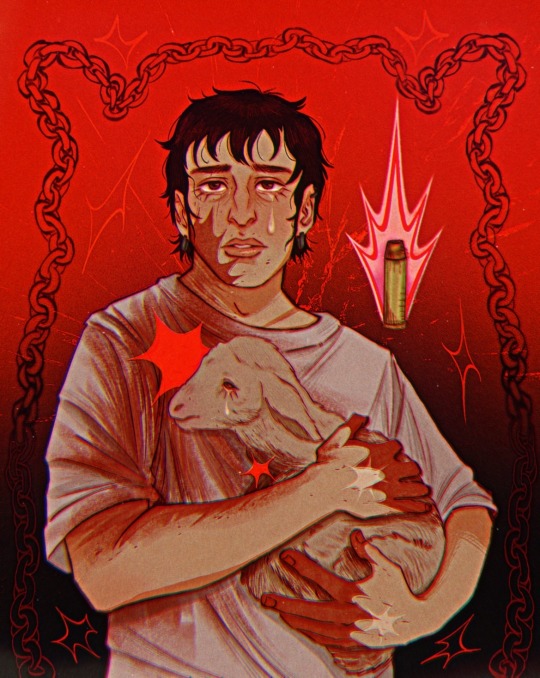#adam rising from the tub / baptism symbolism
Text

🫀🫀🫀
and he has come to absolve you of your sins, the sacrificial lamb weeps for it knows it’s fate is sealed
#alexa. play pyramid song by radiohead#adam stanheight#adam faulkner stanheight#saw#saw 2004#saw movies#saw franchise#saw fanart#adam stanheight fanart#elijah art#for the love of god. please click for better quality!!#something something the biblical symbolism behind saw 2004#adam rising from the tub / baptism symbolism#adam needing to die so Lawrence can be ‘saved’#so Lawrence can fully understand the gravity of death and what his patients are feeling when he tells them they are terminal#adam saving Lawrence and still having to die#John playing god#his name is fucking adam dude#it all starts with adam#fuck man#I MIGHT be insane.#it’s the ex-catholic in me
2K notes
·
View notes
Text
"White Noise," directed by Noah Baumbach, film review and Ballardian Interpretation.

Noah Baumbach's latest film, "White Noise," truly shines in its ability to portray the absurdity of the 70s with great skill. While it may have faced some challenges in gaining the attention it deserved, being released exclusively on Netflix, I strongly believe that it is a must-see for anyone interested in immersing themselves in the cultural atmosphere and quirky charm of that era. Furthermore, if you have a passion for the history of cinema and cult films, then this film will undoubtedly captivate your cinematic senses.
In many ways it reminded me strikingly of Paul Thomas Anderson's "Liquorice Pizza" in numerous ways. Both masterfully transport viewers to the 70s, capturing the zaniness that defined the era. But both offer contrasting perspectives on life during those times. While “Liquorice Pizza" chose to show more lightheartedness and adventure, encapsulating the unpredictable spirit of the time. In stark contrast, "White Noise" presents a more pessimistic view, dipping into darker tones. It portrays characters trapped in the suburban consumer malaise that greatly signified the era.
The film initially introduces us to the characters and their mundane conflicts in everyday life, particularly focusing on the main character, Professor Jack Gladney, played by Adam Driver. Jack tries to break free from the monotony by recounting stories about cult-like leaders such as Hitler and Elvis, shared by his friend Murray, played by Don Cheadle.
"White Noise" almost feels like a parody of a Spielberg disaster movie, complete with a disaster scenario that darkens the tone, reminiscent of Spielberg's work. The film explores the concept of collective events, whether real or imagined, as a means for individuals to feel connected and significant. The characters' obsession with disasters mirrors society's fascination with apocalyptic scenarios depicted in Spielberg's films. By immersing themselves in these narratives, people find purpose and briefly escape the mundane realities of their lives.
This episode leads you to become completely mistaken about the type of film you are watching as an even darker twist in the movie reveals itself, a twist portrayed through Jack's wife, Babette., played brilliantly by Greta Gerwig. Her character spirals out of control, having a more personal disaster which sends her down a path of addiction and self-destruction, fueled by prescription drugs. This situation echoes the extremities of consumerism with compulsive behaviour, addiction and a person lost on consumer products of a stronger verity.
The film concludes with what appears to be a celebratory 'musical' number in a supermarket, once again genre-shifting to bear a resemblance to the Musical genre. Yet beneath the shiny surface of the supermarket and happy singing, it harbors a darker implication. This ending suggests that the characters are completely ingrained and trapped into this suburban consumerism nightmare. They are forever doomed to be stuck in this cycle, oblivious to their predicament, making it nearly impossible to break free. The only relief they discover lies in the next major national, global, or personal catastrophe. Or with the rise of another cult leader, someone akin to Hitler or Elvis, or perhaps a hybrid of both, mirroring figures like Reagan or Trump, who guide them down yet another barmy disaster path.
In comparison, "Liquorice Pizza" offers a more optimistic perspective, showcasing an exotic country filled with random occurrences and never a dull moment. The main character becomes a hot tub salesman, a role that symbolizes the provision of a slice of paradise and purifying baptism until the ultimate gig in the sky. It's a whirlwind of adventures and experiences that keep boredom at bay.
White Noise delves into the darker side of human existence, drawing inspiration from J.G. Ballard's bleak outlook on society. The characters in the film appear to be trapped in a cycle of emptiness and discontent, leading them to seek out intense, dramatic experiences to feel alive. From surviving disasters to fabricating their own crises, the characters are driven by a desire to be part of a larger myth, seeking purpose in a world that seems devoid of meaning. Baumbach skillfully portrays this Ballardian perspective, highlighting the disillusionment that pervades society and the desperation to find something meaningful amidst the chaos. In conclusion,
"White Noise" is a film that, on the surface, appears wacky and surreal, more so than something that treats itself with any seriousness. On initial viewing, one might easily dismiss it as merely a goofy spectacle. However, when observed in a certain light, its depth becomes apparent: it thoroughly explores with cynicism the void that underpins suburban consumerism. This piece presents a bleaker perspective of the 70s. Despite not receiving the widespread attention it arguably deserved, it is a great viewing experience for cult cinema aficionados.
#FilmReview#WhiteNoise#Noah Baumbach#Greta Gerwig#NewBlogAlert#Tumblr#LinkInBio#BloggerLife#ContentCreator#DigitalStorytelling#BlogLaunch#WritersOfInstagram#WatchThisSpace#JoinTheJourney#*©#blog#journalism#design#copywriting#advertising#fashion#Music#london#Style#graphic design ~#art#musicculture#short form#Culture#Critic
0 notes